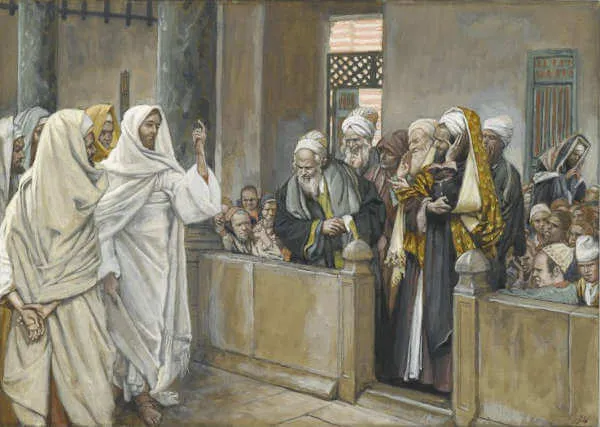The Danger of Obstinacy
“I shall ask you one question. Answer me, and I will tell you by what authority I do these things. Was John’s baptism of heavenly or of human origin? Answer me.”
Reflection:
This is Jesus’ response to the chief priests, the scribes, and the elders when they approached Jesus in the Temple area and asked Him by what authority He did the things He did. And what was it that Jesus did? The day before, Jesus had been in the Temple and drove the money changers out, telling them, “Is it not written: ‘My house shall be called a house of prayer for all peoples’? But you have made it a den of thieves.” This outraged the religious leaders, and they immediately began to discuss how they could put Jesus to death.
Consider, first, the tension in the air. They literally were plotting to put Jesus, the Son of God, to death. They were filled with hatred and jealousy and refused to believe in Him. Jesus saw their hardness of heart and put them on the spot to first answer His question before He would answer theirs. Why would Jesus do this?
The question Jesus asked them was actually an act of great mercy on His part. He gave them an opportunity to repent. If they had only answered His question with humble faith and honesty, they could have saved their lives. Instead, they discussed among themselves His question and gave the politically correct answer. If they had said John’s baptism was of human origin, and not from God, they were afraid that the people would turn on them. So they simply said, “We do not know.” But imagine if they would have given the right answer. What if they had discussed it among themselves and concluded that John’s baptism truly was from God and that they should have believed in him? If they would have only humbled themselves, admitted that they had gravely erred in regard to John, then Jesus would have answered their question, and their life of true faith could have begun. But they didn’t. They remained obstinate. They could not admit they were wrong.
Obstinacy is among the most dangerous of sins. It’s a sin that cannot be forgiven, because, in essence, it’s a refusal to change. And when a person refuses to admit their sin, and refuses to change, then God cannot help them. They remain lost in their sin and suffer the consequences.
Do you struggle with obstinacy in your life? Do you find it difficult to admit when you are wrong? Do you find it difficult to apologize to another and seek to change?
Reflect, today, upon anything you remain obstinate about. Are there matters of faith that you refuse to believe? Are there broken relationships that you refuse to humbly restore? Do you justify your sin and refuse to admit your guilt and need to change? Pray to our Lord for the gift of a humble heart. Humility, in many ways, is nothing other than being completely honest with yourself and others before God. Do not follow the example of these religious leaders. Humbly seek to remove all obstinacy from your heart so that Our Lord can enter in and bring His mercy into your life.
Source: https://catholic-daily-reflections.com/2024/05/31/the-danger-of-obstinacy-3/








